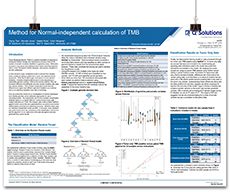
Method for Normal-independent calculation of TMB
Building reliable germline variant estimates appropriate for use in calculating burden
Tumor Mutational Burden (TMB) is a putative biomarker of response to checkpoint inhibitor therapy and comprises a summary metric of the number of somatic mutations identified in a genomic assay. While early success in lung cancer and melanoma have shown improved response rates in these checkpoint inhibitor therapies, utility across indications is not fully understood.
In most standard cases, mutational burden is derived from samples where mutational calling is performed in tumor and matched normal specimens. While this is ideal to get a true sense of tumor derived mutations, it creates limitations due to cost of extra sequencing or unavailable genomic profiling. Without this normal material, there are increased difficulties of eliciting the accurate somatic mutation calls away from natural variation. This is further complicated by the fact that different tumor types have different spectra of mutations so a method built on an individual indication have risks of overfitting.
Here we present the results of our investigations of machine learning to build reliable germline variant estimates appropriate for use in calculating burden. We examine the use of tumor mutation classification methods based on our latest TMB tool: random forest across eight multiple indications in TCGA. We compare calls made by these methods against burden scores that were generated from our paired tumor/normal method (sister submission) to determine accuracy.
Authors: Yiqing Tian, Wendell Jones, Natalie Mola, Victor Weigman
Complete the form below to access this scientific poster








